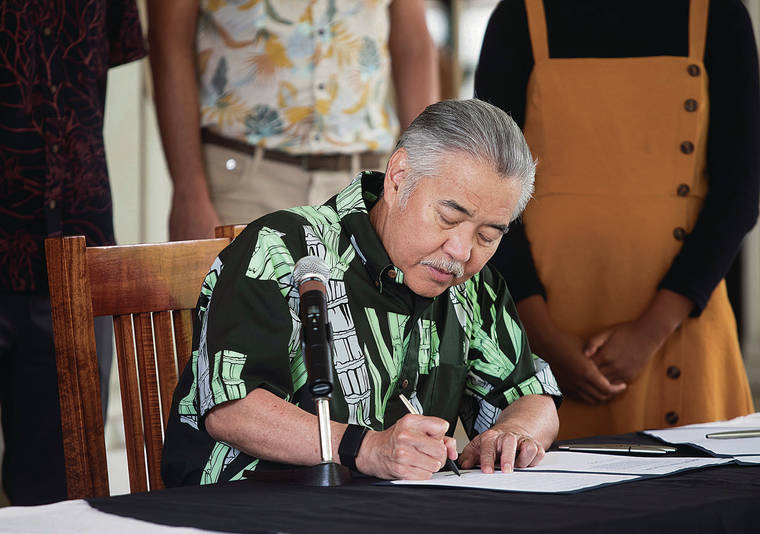Gov. David Ige on Friday signed a suite of bills into law aimed at advancing the state’s goals of environmental sustainability, including measures that address the impacts of sea level rise,
aid local food production and promote greater economic diversification.
“Sustainability is not
simply a goal, it is a commitment — a commitment and responsibility for all of us throughout the state of Hawaii,” Ige said during a bill-signing ceremony.
Two of the bills aim to better prepare the state’s coastlines for accelerated sea level rise.
House Bill 243 requires state agencies to identify existing and planned state facilities that are vulnerable to increased flooding and more powerful storms associated with climate change, and assess such options as flood-proofing or relocating buildings and infrastructure inland.
Another measure, Senate Bill 474, requires property owners selling homes, hotels and condos along Hawaii’s coastlines to disclose whether the properties
are at risk from sea level rise.
Property owners are already required to disclose any material facts about their property that could
affect its future value. Under this measure, which
will take effect in May, sellers must specifically cite whether a property is expected to be affected by
sea level rise by midcentury based on maps developed by scientists at the University of Hawaii at
Manoa. The detailed maps are searchable by address
and lot number, and provide an analysis of the
risks of flooding and coastal erosion for individual properties based on different sea level rise projections.
Ige also signed three bills into law that seek to increase demand for local food products. House Bill 767 tasks the Department of Education with the goal of deriving at least 30%
of food served in public schools from locally sourced products by
2030. House Bill 817 sets out similar benchmarks
for state departments that purchase produce, requiring them to gradually increase the share of fruits and vegetables that come from local producers.
Senate Bill 512 helps SNAP recipients increase their purchase of Hawaii-grown fruits and vegetables.
“We have set a goal of doubling local food production,” said Ige. These “bills will help create demand for our local products that will benefit both growers and consumers. We do know that if we can create a
market for our local farmers, they will fill it.”
Two other measures signed by Ige aim to diversify the economy. House Bill 1176 creates a “green jobs” program to be administered by the Department of Land and Natural Resources. The job corps
program is to provide
work in fields such as natural resources management, agriculture, conservation and renewable energy. The Legislature appropriated $5 million in federal funds from the American Rescue Plan Act to fund the program.
Another measure, House Bill 683, creates an aviation fuel program to provide matching grants to small businesses in Hawaii
that are developing products related to sustainable
aviation fuel or that
help reduce greenhouse gases from commercial aviation.

